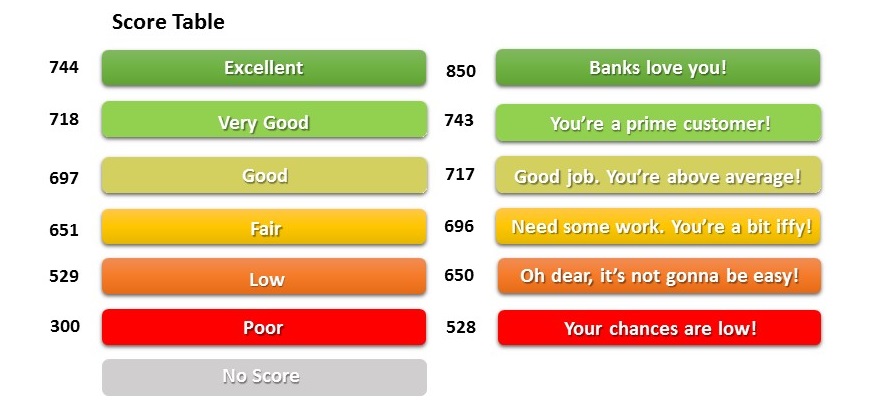If you’re like most people, you probably only ever think about your credit score when you find yourself in need of a loan be it a personal loan, auto loan or a property loan. It’s one of those “out of sight, out of mind” kind of things.
Unfortunately, you may be doing yourself a disservice by adopting such an attitude. Your credit score is what stands between you and the bank’s decision to approve that loan or credit card that you just applied for.
Read on and we’ll tell you what you need to know about your credit score rating!
Your credit score rating and report
Simply put, think of it as your three-digit financial report card which represents the risk a Bank takes when it lends you money.
The report contains your financial information such as outstanding credit, loans, credit card and loan application history, payment history etc. In short, it’s a summary of all your financial activities throughout your life.
Meanwhile, the score is an indication of your repayment capability. A good CTOS credit score ranges between 697 and 850. With a high score, your chances of loan approval increases.
Quick Tip: You can also use our personal loan calculator to estimate how much you can afford to borrow.
Importance of your credit score rating
It’s important because:
>> It’s an indication of your capability to repay as well as your repayment attitude or behaviour
>> This is primarily what the Bank will look at when you apply for a personal loan or credit card.
Understanding your three-digit credit score
Let’s take a look at the numbers. Your three-digit credit score ranges from 300 (poor) to 850 (excellent). The table below illustrates the different levels.

How is your credit score calculated?
Your score is based on information gathered from CCRIS and CTOS. The following factors are taken into consideration when calculating your credit score.
Payment Behaviour: This is the most important factor when it comes to your credit score. It makes up 45% of the total score. So make sure you PAY YOUR BILLS ON TIME.
Amount Owed: Making up 20% of your total credit score, this is the second most important factor. It is the number of loans you have and the amount of credit you owe to banks. More will reduce your credit score.
Credit history: The length of time you have held a credit facility (loan or credit card) affect 7% of your credit score.
Credit Mix: This refers to the type of loans and credit cards you hold and makes up 14% of your total score. Mortgages and auto loans are secured loans, while credit cards and personal loans are unsecured. Its good practice to hold different types of debt as this will increase your score.
New loans: The remaining 14% comes from any recently approved lines of credit. This could be damaging as it reduces your ability to borrow, and if you pay late or default. However, this is only temporary and can easily be recovered provided you consistently pay on time.
Sourced from ctoscredit.com.my
Checking Your Credit Score
It’s good practice to check your credit score once a year. That way you’ll always know where you stand and when to take steps to improve your score. By doing so, you’re less likely to face rejection when it comes time to apply for that loan or credit card.
In Malaysia, there are 4 main sources providing credit scores and reports. The main one being CCRIS, which is managed by the Credit Bureau of Bank Negara. In addition to this, there are other private companies that also provide credit reports, and are licensed under the Credit Reporting Agencies Act 2010. These agencies have access to CCRIS, but also provide additional information in their credit reports. Each has its own method of calculating and reporting so your score will not be the same for all.
Central Credit Reference Information System (CCRIS)
>> A repository of credit reports from banks and financial institutions managed by Credit Bureau of Bank Negara Malaysia
>> Report contains individuals profile and financial behaviour such as loans applied for, and credit details like outstanding amounts.
>> It does not provide a credit score.
>> Calculates your score based on information gathered from CCRIS
>> Other sources of information include the Insolvency Department of Malaysia, Companies Commission and others.
An individual’s debt repayment pattern, overdue accounts, outstanding credit and frequency of credit application is what determines their score.
The agencies MyScore is based on your debt repayment pattern, outstanding loans and credit application pattern. It also assesses the probability of defaulting debt.
Now that you have the low down on all things to do with your credit score rating, take a look at how you can change your spending habits to improve your finances. Everything is inter-related. Good luck!
Disclaimer: This content is for informational purposes and
You May Also Be Interested In

